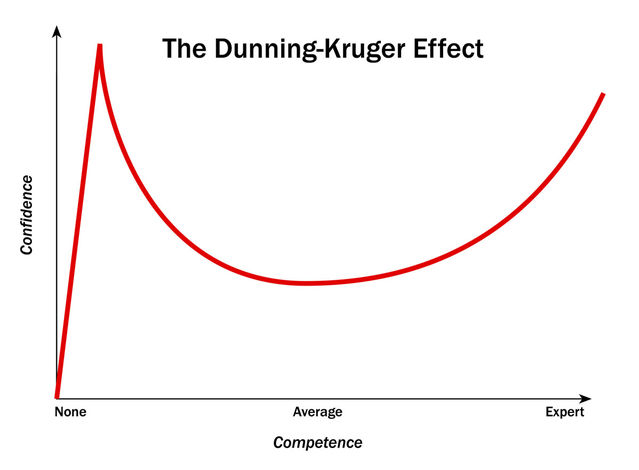- +1 512-591-8295
- [email protected]
- Mon - Fri: 9:00 - 16:00

A recurring issue that entrepreneurs coming to us for marketing advice have frequently encountered, which we’ve discussed previously, is the impact of poor marketing guidance they’ve received in the past.
Typically, this isn’t a result of ill intent. More often, it stems from the Dunning-Kruger effect.
In the field of psychology, the Dunning–Kruger effect is a cognitive bias in which people mistakenly assess their cognitive ability as greater than it is. It is related to the cognitive bias of illusory superiority and comes from the inability of people to recognize their lack of ability.
Wikipedia
In other words, they don’t know what they don’t know.
That’s a lot of industry terms, so we’ll attempt to simplify it a bit.
Professor Dunning said, “the knowledge and intelligence that are required to be good at a task are often the same qualities needed to recognize that one is not good at that task.”
The effect is named after researchers David Dunning and Justin Kruger, the two social psychologists who first described it. In their original study on this psychological phenomenon, they performed a series of four investigations.
People who scored in the lowest percentiles on tests of grammar, humor, and logic also tended to dramatically overestimate how well they had performed. Their actual test scores placed them in the 12th percentile, but they estimated that their performance placed them in the 62nd percentile.
Here’s a few examples of places where we’ve seen the Dunning-Kruger effect related to marketing advice:
One of our clients said “my marketing coach told me that I have to post a Facebook live video every day”. What they wanted to know is … do I really have to do a live video every day for my marketing?
Yes, live video can have a place in your Facebook marketing strategy, but it’s not the primary thing, the only thing, nor the most important thing you should be doing.
This client came to us and said that they learned you have to use a grid system on Instagram to reflect your brand and get engagement.
While this aesthetic can have a place in your Instagram strategy, but it’s not the ONLY strategy, nor the main one that you need to be worried about.
This is a fairly common problem we see. This client had a logo designed by a relatively new designer … and it’s bad for reproduction purposes.
They’ve gotten a friend who likes to design, and the design looks good in most cases, but the friend has no experience with some of the technical requirements to be able to use their logo for different commercial printing purposes, such as needing different file types or color profiles. The designer didn’t know what they didn’t know.
I’ve seen this happen, more than once. A freelancer had gone through a particular marketing training course (one of the big names you’d recognize that are too big to get individual attention) and then worked with an entrepreneur who later came to me as a client. This is the same course some of my team have taken on their journey to improve their own skills, so I know a lot about it.
In this particular case, the freelancer was telling the client not to put a direct call-to-action in their copy.
Just to clarify, I even reached out to the staff that handles the training to ask them if this was taught in their course (I needed to make sure that my own team had not learned this bad advice!) Of course they said absolutely not, the call to action is a very important part of your copy and needs to be very clear.
The freelancer just didn’t understand. Keep in mind, there’s most often no requirements to pass these courses before using whatever system you learned on an unsuspecting client, and therefore no way for the person selling the course system to gauge if anyone actually knows what they’re doing.
Here’s what’s going on when the marketing advice you’ve been given doesn’t work
The similar theme through these four examples is that someone has taken a course or a training, or worked with a coach (marketing MLM), who has given them information. It’s very possible that information was accurate, but the person hearing it didn’t process it the same.
In most cases it’s because of lack of experience.
I can relate this to yet another example that happened with one of my clients.
I was working with my client on their WooCommerce e-commerce website through WordPress. As part of the included training on how to use your new website, I was teaching her how to add new products and some of the things she needs to make sure to do. One of the pieces she wanted was automatically posting the products to Facebook, so we set up that integration.
I was walking her through and showing her how easy it is to get a new product on Facebook, and showed on her how on the WordPress site, in the WooCommerce product edit screen, it would show each Facebook variation as a random combination of numbers. I told her that she didn’t need to worry about what numbers it puts, just to make sure it had generated one of those item numbers which would mean that the integration worked.
Keep in mind, one thing we understand very well is that the majority of our clients are not tech experts. Many entrepreneurs feel like you’re speaking Green when you talk about any kind of technology. I get it! That’s why we are so good at putting tech in normal language, and that’s why people love our marketing training so much – we explain it and you don’t have to know all the technical jargon to understand.
So I always keep in mind that the client may not understand. That’s why we told her that she doesn’t need to understand why it’s doing this, just pointing out where to make sure it had automatically been done.
Several months later, after that piece of the project was long done, the client came back to us and said:
“I was talking to a friend of mine who does Facebook and she said you don’t know what you’re talking about. Facebook doesn’t do anything with just a bunch of random numbers, and so you don’t know what you’re doing.”
At first my initial reaction was wondering “what the heck is she talking about?”, so I went back through the notes of our discussions and saw where I had showed her that integration on the WooCommerce WordPress side for this automatic connection to Facebook.
Her friend does Facebook, but doesn’t have any experience with WooCommerce to understand what I was talking about. She was assuming expertise that she didn’t actually possess.
If you take a regular X/Y graph that you used in math long ago … Before you know anything about a subject, you’re at 0,0

When you are introduced to a new subject, suddenly this whole new world opens to you – you’re excited and actively read and study and watch videos and learn more – and the graph shoots way up in a really short timeframe. You have put in a LOT of time, and your learning went from zero to 100, so you have a LOT of confidence in your knowledge.
Sort of like a teenager. They know it all, right? lol (Disclaimer: I love kids)
Then, over time as you learn more, you move along your horizontal axis and that line starts to slope back down. You begin to realize that you don’t know nearly as much as what you thought you did. You experience even more things about this new subject that you never even realized or thought of … which makes you start to realize that you don’t know quite as much as you thought you did.
More like a young adult who suddenly realizes the parental unit may actually know a thing or two.
As you gain more and more experience as time goes on, it slowly aims back up towards the top as you do gain solid expertise.
In a way, you might call the opposite of the Dunning-Kruger effect Imposter Syndrome.
Imposter Syndrome happens when you’ve gotten to the point where you realize you don’t know nearly as much about the subject that you thought you knew a lot about. Even though you have a lot of experience you feel like an imposter – “people are going to know that I don’t know everything!”
That big upswing at the initial part of the graph is the point sometimes that people believe they’re an expert, and since they’re so excited they may be taking courses, working with coaches, or training and learn a particular method. I call this the “fakexpert” spot.
Because the person doesn’t know as much about the topic, they may not understand some pieces that they’ve never run into yet, but turn around and now teach it to their own clients. They can be using the same framework from their teacher, yet because they don’t understand some of the pieces, or they have misunderstood some of the information, or they are missing critical experience, this can be why the marketing advice you’ve received hasn’t worked so well.
Because they’re new, they don’t know what they don’t know. This is true of all of us. I have a lot of fakexpert spots in my own life (marketing isn’t one of them). We all do.
As I talk about our industry with some of my peers in marketing, we discuss the new entrepreneurs who have been doing social media marketing for businesses professionally for only a few months, or with only one or two clients. We’ve gathered with decades of experience each, we know what we don’t know, and we hear people being given marketing advice that isn’t quite on the mark, or in some cases flat out incorrect.
Both Dunning-Kruger and Imposter Syndrome are interesting psychological effects.
Even with three decades of marketing expertise under my belt, right up to the CMO level, I sometimes catch myself grappling with Imposter Syndrome. My journey with social media marketing stretches back nearly two decades! I hopped on the Facebook bandwagon in 2005, back when an .edu email was your golden ticket in. At the time, I was immersed in the non-profit world, leveraging Facebook to spark an interest in college students to volunteer with us. And it wasn’t just Facebook; I was already navigating other platforms that were around before it. As the social media landscape expanded with the likes of Twitter, LinkedIn, and Pinterest, I was right there, an early adopter, always one step ahead. It’s crucial for me to stay on the cutting edge, to ensure my clients are always clued into the best ways to harness these platforms for their marketing needs. So here I am, nearly twenty years later, still riding the ever-evolving social media wave.
I’ll tell you I don’t know everything, but I know a lot.
The world is wide open to learning, which is something that I love about the internet – when it’s good advice. If you don’t know a subject, it’s hard to weed through the internet and figure out what actually is the good marketing advice and what is not.
That’s what happens with many of our clients. They’ve worked with coaches or consultants or taken training classes from someone who is in the initial part of that upswing of the Dunning-Kruger Effect.
Remember, Professor Dunning said,
“the knowledge and intelligence that are required to be good at a task are often the same ones needed to recognize that you’re not good at a task.”
These new coaches/consultants are still becoming good at the task and don’t have the same knowledge to recognize what’s missing, to understand what they don’t understand, to know what they don’t know. That doesn’t mean they’re bad, and in fact I mentor quite a few at this stage to help them learn more.
To effectively mitigate this cognitive bias, it’s essential to consider the depth of hands-on marketing experience that your collaborator brings to the table.
In the realm of social media, the sheer abundance of online endorsements—like Yelp reviews and various platforms where clients can share their positive feedback—can sometimes overshadow the fundamental value of experience. Don’t get me wrong, glowing testimonials are fantastic, and I always appreciate reading about clients’ satisfying encounters. However, there’s an undeniable weight to the wisdom gained from extensive experience and a history of diverse client engagements in the marketing sector.
So check that for on the person that you’re getting your marketing advice from.
If you do want some straight-shooting marketing advice – no BS we tell it to you how we know it’s worked for clients in the past – that’s what we offer.

Simple processes. Effective results.
The exact step-by-step how to for individual marketing strategies plus how to put it all together for use with YOUR unique business.
Get the marketing advice I share with my entrepreneur friends ...
... right in your inbox

Let the pros handle your social media.
Get solid marketing strategies, designed for entrepreneurs on the track to 7-figures and beyond, right in your inbox.

This website uses cookies to ensure you get the best experience on our website. By continuing to use the website, you agree to our use of cookies. We do not share or sell your information. More info
